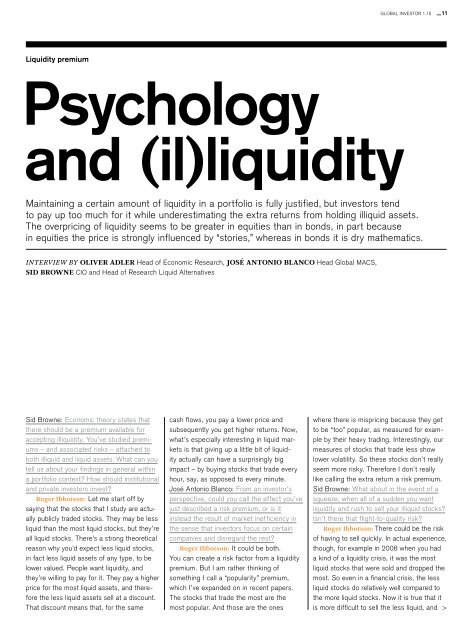Illiquid assets
Unwrapping alternative returns Global Investor, 01/2015 Credit Suisse
Unwrapping alternative returns
Global Investor, 01/2015
Credit Suisse
Create successful ePaper yourself
Turn your PDF publications into a flip-book with our unique Google optimized e-Paper software.
GLOBAL INVESTOR 1.15 — 11 ><br />
Liquidity premium<br />
Psychology<br />
and (il)liquidity<br />
Maintaining a certain amount of liquidity in a portfolio is fully justified, but investors tend<br />
to pay up too much for it while underestimating the extra returns from holding illiquid <strong>assets</strong>.<br />
The overpricing of liquidity seems to be greater in equities than in bonds, in part because<br />
in equities the price is strongly influenced by “stories,” whereas in bonds it is dry mathematics.<br />
INTERVIEW BY OLIVER ADLER Head of Economic Research, JOSÉ ANTONIO BLANCO Head Global MACS,<br />
SID BROWNE CIO and Head of Research Liquid Alternatives<br />
Sid Browne: Economic theory states that<br />
there should be a premium available for<br />
accepting illiquidity. You’ve studied premiums<br />
– and associated risks – attached to<br />
both illiquid and liquid <strong>assets</strong>. What can you<br />
tell us about your findings in general within<br />
a portfolio context? How should institutional<br />
and private investors invest?<br />
Roger Ibbotson: Let me start off by<br />
saying that the stocks that I study are actually<br />
publicly traded stocks. They may be less<br />
liquid than the most liquid stocks, but they’re<br />
all liquid stocks. There’s a strong theoretical<br />
reason why you’d expect less liquid stocks,<br />
in fact less liquid <strong>assets</strong> of any type, to be<br />
lower valued. People want liquidity, and<br />
they’re willing to pay for it. They pay a higher<br />
price for the most liquid <strong>assets</strong>, and therefore<br />
the less liquid <strong>assets</strong> sell at a discount.<br />
That discount means that, for the same<br />
cash flows, you pay a lower price and<br />
sub sequently you get higher returns. Now,<br />
what’s especially interesting in liquid markets<br />
is that giving up a little bit of liquid -<br />
ity actually can have a surprisingly big<br />
impact – by buying stocks that trade every<br />
hour, say, as opposed to every minute.<br />
José Antonio Blanco: From an investor’s<br />
perspective, could you call the effect you’ve<br />
just described a risk premium, or is it<br />
instead the result of market inefficiency in<br />
the sense that investors focus on certain<br />
companies and disregard the rest?<br />
Roger Ibbotson: It could be both.<br />
You can create a risk factor from a liquidity<br />
premium. But I am rather thinking of<br />
something I call a “popularity” premium,<br />
which I’ve expanded on in recent papers.<br />
The stocks that trade the most are the<br />
most popular. And those are the ones<br />
where there is mispricing because they get<br />
to be “too” popular, as measured for example<br />
by their heavy trading. Interestingly, our<br />
measures of stocks that trade less show<br />
lower volatility. So these stocks don’t really<br />
seem more risky. Therefore I don’t really<br />
like calling the extra return a risk premium.<br />
Sid Browne: What about in the event of a<br />
squeeze, when all of a sudden you want<br />
liquidity and rush to sell your illiquid stocks?<br />
Isn’t there that flight-to-quality risk?<br />
Roger Ibbotson: There could be the risk<br />
of having to sell quickly. In actual experience,<br />
though, for example in 2008 when you had<br />
a kind of a liquidity crisis, it was the most<br />
liquid stocks that were sold and dropped the<br />
most. So even in a financial crisis, the less<br />
liquid stocks do relatively well compared to<br />
the more liquid stocks. Now it is true that it<br />
is more difficult to sell the less liquid, and

















